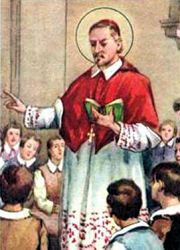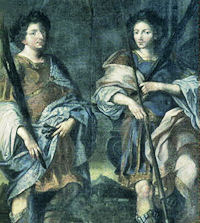Ordinary Time: June 18th
Friday of the Eleventh Week in Ordinary Time
Other Commemorations: Sts. Mark & Marcellianus, Martyrs (RM); St. Gregory Barbarigo, Bishop (RM)
» Enjoy our Liturgical Seasons series of e-books!
The virtues of gratitude, confidence and love, stimulated and motivated by the Holy Eucharist, are especially necessary in the modern world. Today gratitude has become a forgotten virtue; confidence in God has been replaced by arrogant self-reliance; love for God and for mankind has been driven from the hearts of many by a spirit of pagan selfishness.
Catholics must strive to revive these virtues and shall have the special help of Our Lord in the Holy Eucharist. If we cultivate a deep and persevering devotion to Him who dwells among us under the humble appearances of bread and wine, particularly if we receive Holy Communion frequently and fervently, we cannot but make progress in the spirit of gratitude, in unwavering confidence in God's assistance, and in ardent love both for God and for our fellowmen.
According to the 1962 Missal of St. John XXIII the Extraordinary Form of the Roman Rite, today is the feast of St. Ephrem. His feast in the Ordinary Form of the Roman Rite is celebrated on June 9. It is also the feast of the martyrs, Sts. Mark and Marcellianus.
Sts. Mark & Marcellianus
Saint Marcus and Saint Marcellianus were twin brothers of an illustrious family in Rome, who had been converted to the Faith in their youth and were honorably married.
When Diocletian ascended the imperial throne in 284, the pagans raised persecutions; the brothers were then thrown into prison and condemned to be beheaded. Their friends obtained a delay of the execution for thirty days, that they might prevail on them to worship the false gods. Tranquillinus and Martia, their afflicted pagan parents, accompanied by their sons’ wives and their little babes, endeavored to move them by the most tender entreaties and tears. But Saint Sebastian, an officer of the emperor’s household, arriving in Rome soon after their confinement, daily visited and encouraged them.
The issue of the conferences was the happy conversion of the father, mother, and wives, also of Nicostratus, the public stenographer, and soon afterwards of Chromatius, the judge, who set the Saints at liberty and abdicating the magistracy, retired into the country. Marcus and Marcellianus were concealed by a Christian officer of the imperial household, in his apartments in the palace, but they were betrayed by an apostate and reimprisoned. Fabian, a judge who had succeeded Chromatius, condemned them to be bound to two pillars, their feet nailed to them. In this posture they remained a day and a night, and on the following day were stabbed with lances. Their martyrdom occurred in the year 286. Their tomb and that of their father, Saint Tranquillinus, was found in Rome, in 1782, in the church of Saint Cosmas and Saint Damian, adjoining that of the martyred pope, Saint Felix II. They are honored particularly in Spain, where the city of Badajoz escaped destruction by their intercession.
—Excerpted from Little Pictorial Lives of the Saints, a compilation based on Butler’s Lives of the Saints, and other sources by John Gilmary Shea (Benziger Brothers: New York, 1894).
Highlights and Things to Do:
- View the painting by Paolo Veronese of Saints Mark and Marcellian Being Led to Martyrdom.
- Read more about Mark and Marcellian:
- Find out more about the Catacombs and Basilica where Mark and Marcellian were laid.
- See the statue of St. Mark on St. Peter's Basilica Colonnade.
St. Gregory Barbarigo
St. Gregory was born on September 16, 1625, and he died in 1697. His family lived in Venice and were held in high repute by the people there. He was the fourth son. He excelled in his studies at an early age and became interested in diplomacy and statesmanship. He knew Contarine, the Venetian ambassador, and went with him on at least one ambassadorial mission.
 After he was ordained a priest in 1655, he organized care for the plague-stricken people of Rome. In 1657, Pope Alexander VII made him the first Bishop of Bergamo. He was a leader in promoting the reforms of the Council of Trent. He visited parishes, organizing the teaching of Christian doctrine and also worked with seminarians and clergy to raise their standards. His work was so respected that in 1660, he was made the Cardinal of Padua.
After he was ordained a priest in 1655, he organized care for the plague-stricken people of Rome. In 1657, Pope Alexander VII made him the first Bishop of Bergamo. He was a leader in promoting the reforms of the Council of Trent. He visited parishes, organizing the teaching of Christian doctrine and also worked with seminarians and clergy to raise their standards. His work was so respected that in 1660, he was made the Cardinal of Padua.
St. Gregory was extremely interested in higher education and worked for the development of seminaries and libraries. He established a printing press that printed pamphlets for Christians under Moslem rule. He was active in laboring to bring about a reunion with the Greek Church. St. Gregory took part in five papal Conclaves (for the election of the Pope) and was a candidate in three of them. It is recorded that his congregation thought him to be a man filled with wisdom.
—Excerpted from St. Gregory Barbarigo Parish Website
Highlights and Things to Do:
- "In Italy it was above all the merit of St. Gregory Barbarigo, at the end of the 17th century to have labored indefatigably for the reorganization of the seminaries of Bergamo and Padua according to the norms laid down by the Council of Trent, keeping in mind all the time the spiritual and cultural needs of his time" —Pope St. Paul VI, Summi Dei Verbum. Read this entire Apostolic Letter on the Occasion of the Fourth Centenary of the Establishment of Seminaries by the Council of Trent.
- Read more about St. Gregory:
- Learn more about the Ambrosian Rite which is celebrated in a number of the parishes in the Diocese of Bergamo.
- His remains are located in the Padua Cathedral, or Basilica Cathedral of Saint Mary of the Assumption in Padua, Italy.






